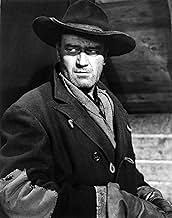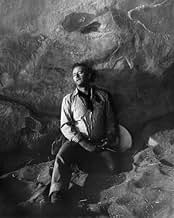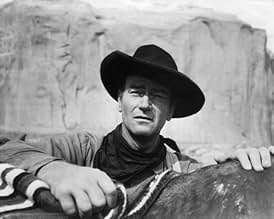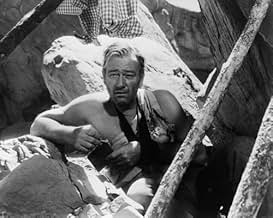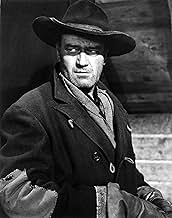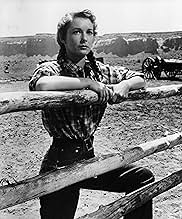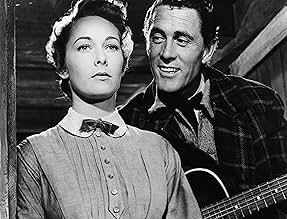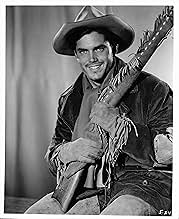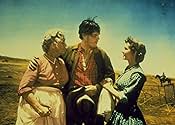Un veterano de la Guerra de Secesión estadounidense emprende un viaje para rescatar a su sobrina de los comanches.Un veterano de la Guerra de Secesión estadounidense emprende un viaje para rescatar a su sobrina de los comanches.Un veterano de la Guerra de Secesión estadounidense emprende un viaje para rescatar a su sobrina de los comanches.
- Dirección
- Guionistas
- Elenco
- Premios
- 4 premios ganados y 4 nominaciones en total
Patrick Wayne
- Lt. Greenhill
- (as Pat Wayne)
- Dirección
- Guionistas
- Todo el elenco y el equipo
- Producción, taquilla y más en IMDbPro
Opiniones destacadas
The best western ever made is how many regard this 1956 John Ford classic. Its star John Wayne gave his most winning performance and it is reputed to have been his favourite movie even to the extent of his naming his last born son Ethan after the character he played. Ford's beloved Monument Valley in Arizona never looked more spectacular in Vista Vision and colour and over the years the picture has gained cult status. An integral part of the combined elements that makes THE SEARCHERS great is Max Steiner's outstanding score. It is the picture's driving force - its backbone. Steiner's music propels the film forward, unifies the narrative and gives greater density to its key scenes. In fact without his music much of the picture's impact would be considerably diminished. Yet I am consistently amazed and at a total loss to see here on these pages - where the best part of 400 reviews appear - that Steiner's music is hardly referred to at all by any of the writers. Not only that but even on the extras of the last DVD release three well established film directors, Martin Scorsese, John Milius and Peter Bogdanovitch each speak glowingly of Ford's masterpiece but fail to mention Steiner's exceptional contribution. Bogdanovitch, at one stage, briefly mentions the music and how good it is but never puts a name on its composer. I find this not only doctrinaire but quite bizarre that these three men, who you would imagine should know better, would have such a detached attitude concerning one of the most perfectly conceived scores for a motion picture. Therefore I will attempt here to amend this anomaly and the afore mentioned omissions and give some deserving credence to Max Steiner's exceptional music for THE SEARCHERS which has well earned its place in the history of cinema.
A veritable orchestral explosion opens the picture in the form of a fanfare over the Warner Bros. logo. As the credits roll we hear the haunting Stan Jones ballad "Song Of The Searchers" wonderfully rendered by Ford favourites The Sons Of the Pioneers. The composer later interpolates this song into his score as the theme for the racist protagonist Ethan Edwards (Wayne). Then a lovely version - scored for guitar, solo trumpet and strings - of the traditional ballad "Lorena" plays under Ford's evocative 'frame within a frame' opening scene as the door of a remote homestead opens to reveal an approaching rider. It then skillfully segues into "Bonnie Blue Flag" to point up the rider's confederate allegiance. The "Lorena" ballad later becomes the family theme and is especially effective on solo violin for the scene where Ethan gives the young Debbie his wartime medal as her "gold locket" ("Oh, let her have it - it doesn't amount to much" declares Ethan somberly). And later it is arrestingly heard on spinet as Ethan bids farewell to the family and rides out with the posse to begin what effectively will be his great search. But where the score really shines is in the powerful music for the Indian sequences. Here there is a palpable authenticity in the scoring. Aided by the clever orchestrations of Murrey Cutter and some virtuoso playing by the Warner Bros. orchestra (particularly in the percussion section) Steiner fires on all cylinders adding realism, pathos and a sense of foreboding. There are echoes of the composer's "King Kong" (1933) in the cue for the scene where the Indians surround the posse and the music becomes rhythmically savage for the charge at the river and for the attack on the Indian camp near the finale. The composer's celebrated "Indian Idyll" (which he originally wrote five years earlier for the Burt Lancaster picture "Jim Thorpe-All American") comes into play and can be heard to splendid effect in the Indian camp sequences and as the motif for Look, Martin's (Jeffrey Hunter) new Indian "wife". Hearing these cues one can't help but wonder how remarkable it is that this most romantic of film composers - steeped in the musical tradition of late 19th century Vienna - his birthplace - should be so ethnically proficient at musically depicting the native American. More akin to what we have come to expect from this composer are lovely cues such as the sprightly theme for Martin and the lush and sweeping music for Martin and Laurie (Vere Miles). The score - and the movie - ends just like it began with "The Song Of The Searchers" playing as Ethan and Martin finally bring Debbie home and conclusively the door of a homestead closes on Ethan where a brief fortissimo quotation from that explosive fanfare closes the picture.
Alongside the great film music works of Miklos Rozsa, Alfred Newman, Dimitri Tiomkin and others Max Steiner's music for THE SEARCHERS stands head high as one the finest scores ever written for one the finest films ever made and as such should, and must, be alluded to in any dissertation or essay on the film.
A veritable orchestral explosion opens the picture in the form of a fanfare over the Warner Bros. logo. As the credits roll we hear the haunting Stan Jones ballad "Song Of The Searchers" wonderfully rendered by Ford favourites The Sons Of the Pioneers. The composer later interpolates this song into his score as the theme for the racist protagonist Ethan Edwards (Wayne). Then a lovely version - scored for guitar, solo trumpet and strings - of the traditional ballad "Lorena" plays under Ford's evocative 'frame within a frame' opening scene as the door of a remote homestead opens to reveal an approaching rider. It then skillfully segues into "Bonnie Blue Flag" to point up the rider's confederate allegiance. The "Lorena" ballad later becomes the family theme and is especially effective on solo violin for the scene where Ethan gives the young Debbie his wartime medal as her "gold locket" ("Oh, let her have it - it doesn't amount to much" declares Ethan somberly). And later it is arrestingly heard on spinet as Ethan bids farewell to the family and rides out with the posse to begin what effectively will be his great search. But where the score really shines is in the powerful music for the Indian sequences. Here there is a palpable authenticity in the scoring. Aided by the clever orchestrations of Murrey Cutter and some virtuoso playing by the Warner Bros. orchestra (particularly in the percussion section) Steiner fires on all cylinders adding realism, pathos and a sense of foreboding. There are echoes of the composer's "King Kong" (1933) in the cue for the scene where the Indians surround the posse and the music becomes rhythmically savage for the charge at the river and for the attack on the Indian camp near the finale. The composer's celebrated "Indian Idyll" (which he originally wrote five years earlier for the Burt Lancaster picture "Jim Thorpe-All American") comes into play and can be heard to splendid effect in the Indian camp sequences and as the motif for Look, Martin's (Jeffrey Hunter) new Indian "wife". Hearing these cues one can't help but wonder how remarkable it is that this most romantic of film composers - steeped in the musical tradition of late 19th century Vienna - his birthplace - should be so ethnically proficient at musically depicting the native American. More akin to what we have come to expect from this composer are lovely cues such as the sprightly theme for Martin and the lush and sweeping music for Martin and Laurie (Vere Miles). The score - and the movie - ends just like it began with "The Song Of The Searchers" playing as Ethan and Martin finally bring Debbie home and conclusively the door of a homestead closes on Ethan where a brief fortissimo quotation from that explosive fanfare closes the picture.
Alongside the great film music works of Miklos Rozsa, Alfred Newman, Dimitri Tiomkin and others Max Steiner's music for THE SEARCHERS stands head high as one the finest scores ever written for one the finest films ever made and as such should, and must, be alluded to in any dissertation or essay on the film.
Even if you've never seen John Ford's THE SEARCHERS, you will have, undoubtedly, seen a film that owes it's 'style' to the film. DANCES WITH WOLVES, THE OUTLAW JOSIE WALES, UNFORGIVEN, JEREMIAH JOHNSON, and OPEN RANGE are just a few westerns that have 'borrowed' from it, but THE SEARCHERS' impact transcends the genre, itself; STAR WARS, THE English PATIENT, THE LAST SAMURAI, even THE LORD OF THE RINGS have elements that can be traced back to Ford's 1956 'intimate' epic. When you add the fact that THE SEARCHERS also contains John Wayne's greatest performance to the film's merits, it becomes easy to see why it is on the short list of the greatest motion pictures ever made.
The plot is deceptively simple; after a Comanche raiding party massacres a family, taking the youngest daughter prisoner, her uncle, Ethan Edwards (Wayne), and adopted brother, Martin Pawley (Jeffrey Hunter), begin a long quest to try and rescue her. Over the course of years, a rich tapestry of characters and events unfold, as the nature of the pair's motives are revealed, and bigoted, bitter Edwards emerges as a twisted man bent on killing the 'tainted' white girl. Only Pawley's love of his 'sister' and determination to protect her stands in his way, making the film's climax, and Wayne's portrayal of Edwards, an unforgettable experience.
With all of Ford's unique 'touches' clearly in evidence (the doorways 'framing' the film's opening and conclusion, with a cave opening serving the same function at the film's climax; the extensive use of Monument Valley; and the nearly lurid palette of color highlighting key moments) and his reliance on his 'stock' company of players (Wayne, Ward Bond, John Qualen, Olive Carey, Harry Carey, Jr, Hank Worden, and Ken Curtis), the film marks the emergence of the 'mature' Ford, no longer deifying the innocence of the era, but dealing with it in human terms, where 'white men' were as capable of savagery as Indians, frequently with less justification.
Featuring 18-year old Natalie Wood in one of her first 'adult' roles, the sparkling Vera Miles as Pawley's love interest, Wayne's son Patrick in comic relief, and the harmonies of the Sons of the Pioneers accenting Max Steiner's rich score, THE SEARCHERS is a timeless movie experience that becomes richer with each viewing.
It is truly a masterpiece!
The plot is deceptively simple; after a Comanche raiding party massacres a family, taking the youngest daughter prisoner, her uncle, Ethan Edwards (Wayne), and adopted brother, Martin Pawley (Jeffrey Hunter), begin a long quest to try and rescue her. Over the course of years, a rich tapestry of characters and events unfold, as the nature of the pair's motives are revealed, and bigoted, bitter Edwards emerges as a twisted man bent on killing the 'tainted' white girl. Only Pawley's love of his 'sister' and determination to protect her stands in his way, making the film's climax, and Wayne's portrayal of Edwards, an unforgettable experience.
With all of Ford's unique 'touches' clearly in evidence (the doorways 'framing' the film's opening and conclusion, with a cave opening serving the same function at the film's climax; the extensive use of Monument Valley; and the nearly lurid palette of color highlighting key moments) and his reliance on his 'stock' company of players (Wayne, Ward Bond, John Qualen, Olive Carey, Harry Carey, Jr, Hank Worden, and Ken Curtis), the film marks the emergence of the 'mature' Ford, no longer deifying the innocence of the era, but dealing with it in human terms, where 'white men' were as capable of savagery as Indians, frequently with less justification.
Featuring 18-year old Natalie Wood in one of her first 'adult' roles, the sparkling Vera Miles as Pawley's love interest, Wayne's son Patrick in comic relief, and the harmonies of the Sons of the Pioneers accenting Max Steiner's rich score, THE SEARCHERS is a timeless movie experience that becomes richer with each viewing.
It is truly a masterpiece!
John Ford is a classic Western filmmaker (though certainly not the only genre in which he excelled), employing the classic Western film star, John Wayne, in perhaps one of the most underappreciated films of our time. Ford builds a thoroughly entertaining movie which explores classic Western themes without necessarily relying on these themes to drive the plot.
Like any good Western, we are inorexably drawn to a kind of Cowboys vs. Indians saga, but Ford manages to draw us into the conflict in such a way that the mere "Cowboys good, Indians bad" aesthetic isn't really applicable here. While relying on the archetypical roles of the two groups to set up a conflict, Ford is ahead of his time in managing to characterize the Indians as more than "noble savages". Wayne's character's (Ethan Edwards) hatred of "the Commanch" is called into question a number of times, especially in his stormy relationship with adopted nephew and fellow searcher Martin Pawley (Jeffrey Hunter), who we are told is a quarter-Indian himself, and cannot bring himself to find the same sort of hatred for the Indians that Ethan holds.
Ethan was a Confederate soldier in the Civil War, returning to his brother's Texas homestead after the war. A group of Commanches, led by the ominous Chief Scar, route and kill his brother's family while Ethan and Martin are investigating a cattle rustling, the Commaches' diversionary tactic. The Indians took the family's youngest daughter, and the majority of the film has us following Ethan and Martin in their attempts to track down Scar and take back the girl, Debbie (played by Lorna and Natalie Wood, at different times).
Such a situation sets up one of the many moral ambiguities that make this more than an ordinary Western: the Commanches slaughtered Ethan's brother and his family - he seemingly has reason to hate them with the almost crazy passion that he does. Yet the more naive Martin cannot bring himself to hate them in such a way, and the split between them becomes a major point of contention when it becomes clear that Debbie has more or less been adopted as a Commanche (the two "Searchers" chase after her for about five years in film time). Furthermore, when the two "Searchers" actually meet Scar, who they've been chasing for years, he is presented as a rather intelligent character, although certainly one filled with vengance - he, too, has his reasons for waging war with the likes of Ethan and Martin, and cannot merely be written off a the type of bloodthirsty savage that is typical of the portrayal of most Indians within the genre.
The film relies on enough classic Western material to imbue with the feel with the sense of such pictures. Aside from the question of Ethan's morality, Wayne plays him with classic John Wayne freewheeling confidence and swagger that made the actor such an icon, and it comes off quite well. We are also given a side story involving Martin's romance with the hard-as-nails Laurie Jurgensen (played by Vera Miles, best known for playing Janet Leigh's sister in "Psycho"). The relationship is from a classic, archetypical Western mold - the two have been in love since they were kids, but Martin has responsibilites to his family that stop him from making the proper time for his beau, and his rough frontier-uprbringing leave him seemingly lacking the proper sensitivity for dealing with Laura (though he does, of course, have a heart of gold).
As a side note, this film should prove immensely interesting to any serious fan of the "Star Wars" trilogy (the original one). While those films undoubtably draw a great deal of inspiration from Kurosawa's samurai films, there is most certainly a great deal (especially in the film subtitled "A New Hope") drawn from here. One scene in particular (when Luke returns to his farm after stormtroopers have blasted in pieces) is virtually ripped straight from "The Searchers". Ford's film is also full of the sort of gallows humor present throughout the trilogy, and even incorporates some rather goofy characters, the half-cracked Mose Harper (Hank Warden) and the incredibly over-the-top rival for Laura's hand Charlie McCorry (Ken Curtis), without ruining the overall serious feel of the film, but managing to squeeze laughs out of absurd situations (such as a fight between Martin and Charlie) without compromising the ability to quickly return to a solemn tone. Such deft touch, as well as the addition of wise-cracking dialogue (provided largely by Wayne and Ward Bond here) are a large part of what made the original trilogy so successful, and it's strikingly similar to the type of paradigm on display between various characters here.
Regardless of ranting and raving about Star Wars, however, this is an excellent film on it's own merit.
Like any good Western, we are inorexably drawn to a kind of Cowboys vs. Indians saga, but Ford manages to draw us into the conflict in such a way that the mere "Cowboys good, Indians bad" aesthetic isn't really applicable here. While relying on the archetypical roles of the two groups to set up a conflict, Ford is ahead of his time in managing to characterize the Indians as more than "noble savages". Wayne's character's (Ethan Edwards) hatred of "the Commanch" is called into question a number of times, especially in his stormy relationship with adopted nephew and fellow searcher Martin Pawley (Jeffrey Hunter), who we are told is a quarter-Indian himself, and cannot bring himself to find the same sort of hatred for the Indians that Ethan holds.
Ethan was a Confederate soldier in the Civil War, returning to his brother's Texas homestead after the war. A group of Commanches, led by the ominous Chief Scar, route and kill his brother's family while Ethan and Martin are investigating a cattle rustling, the Commaches' diversionary tactic. The Indians took the family's youngest daughter, and the majority of the film has us following Ethan and Martin in their attempts to track down Scar and take back the girl, Debbie (played by Lorna and Natalie Wood, at different times).
Such a situation sets up one of the many moral ambiguities that make this more than an ordinary Western: the Commanches slaughtered Ethan's brother and his family - he seemingly has reason to hate them with the almost crazy passion that he does. Yet the more naive Martin cannot bring himself to hate them in such a way, and the split between them becomes a major point of contention when it becomes clear that Debbie has more or less been adopted as a Commanche (the two "Searchers" chase after her for about five years in film time). Furthermore, when the two "Searchers" actually meet Scar, who they've been chasing for years, he is presented as a rather intelligent character, although certainly one filled with vengance - he, too, has his reasons for waging war with the likes of Ethan and Martin, and cannot merely be written off a the type of bloodthirsty savage that is typical of the portrayal of most Indians within the genre.
The film relies on enough classic Western material to imbue with the feel with the sense of such pictures. Aside from the question of Ethan's morality, Wayne plays him with classic John Wayne freewheeling confidence and swagger that made the actor such an icon, and it comes off quite well. We are also given a side story involving Martin's romance with the hard-as-nails Laurie Jurgensen (played by Vera Miles, best known for playing Janet Leigh's sister in "Psycho"). The relationship is from a classic, archetypical Western mold - the two have been in love since they were kids, but Martin has responsibilites to his family that stop him from making the proper time for his beau, and his rough frontier-uprbringing leave him seemingly lacking the proper sensitivity for dealing with Laura (though he does, of course, have a heart of gold).
As a side note, this film should prove immensely interesting to any serious fan of the "Star Wars" trilogy (the original one). While those films undoubtably draw a great deal of inspiration from Kurosawa's samurai films, there is most certainly a great deal (especially in the film subtitled "A New Hope") drawn from here. One scene in particular (when Luke returns to his farm after stormtroopers have blasted in pieces) is virtually ripped straight from "The Searchers". Ford's film is also full of the sort of gallows humor present throughout the trilogy, and even incorporates some rather goofy characters, the half-cracked Mose Harper (Hank Warden) and the incredibly over-the-top rival for Laura's hand Charlie McCorry (Ken Curtis), without ruining the overall serious feel of the film, but managing to squeeze laughs out of absurd situations (such as a fight between Martin and Charlie) without compromising the ability to quickly return to a solemn tone. Such deft touch, as well as the addition of wise-cracking dialogue (provided largely by Wayne and Ward Bond here) are a large part of what made the original trilogy so successful, and it's strikingly similar to the type of paradigm on display between various characters here.
Regardless of ranting and raving about Star Wars, however, this is an excellent film on it's own merit.
John Ford and John Wayne re-team for their best and most famous western. Wayne plays returning Civil War veteran Ethan Edwards, who comes to the Texas ranch of his brother on hopes of settling down to a new life. Unfortunately, these plans are cruelly thwarted when the ranch(filled with the women and children) is raided by ruthless and renegade Indian chief Scar, who attacks and massacres the family, except for little Debbie Edwards(Natalie Wood) Ethan, enraged and distraught by this raid, vows to track down and kill the tribe, and rescue his niece, with the help from his nephew Martin(played by Jeffrey Hunter). This search takes several years of their lives, across the country and through all kinds of weather and obstacles, until one day they finally locate Debbie, who is now assimilated into the tribe Ethan hates, and he may not be able to spare her...
Gorgeously filmed on location in Ford's beloved Monument Valley, with an intelligent and ambitious script and a superlative performance by Wayne, as a driven and vengeful man who is not always likable, but is still righteous and fascinating. Film does ramble a bit, and the outcome is not really in doubt, but excellent film is still worth watching, with an astonishing closing scene.
Gorgeously filmed on location in Ford's beloved Monument Valley, with an intelligent and ambitious script and a superlative performance by Wayne, as a driven and vengeful man who is not always likable, but is still righteous and fascinating. Film does ramble a bit, and the outcome is not really in doubt, but excellent film is still worth watching, with an astonishing closing scene.
A lone home amidst tranquil mesas. A family gathers on their front porch to watch a solitary man ride slowly up to their ranch on his horse in the waning sun. He stops, disembarks and walks up to the house, all in one single weary move. Note his stance, the rugged tiredness of life etched on his face. This lone drifter is Ethan Edwards (John Wayne) and is perhaps the most brilliant character devised by Wayne and director John Ford. As the film progresses, we learn of his military days, his contempt of Indians and, most importantly, his psyche. Compared to another John ford movie, "Stagecoach", we can see the massive differences in character psychology and within the genre itself. Gone are the days of the brave hero riding in to save the day with wistful smiles all around; instead we have a savage man on an odyssey of revenge, hatred and bloodshed.
In one scene, Ethan and a search party comes across a dead Indian buried in the ground. Ethan's suppressed rage overcomes him, and he shoots the corpse's eyes out. "What good did that do ya?" asks the Reverend. Ethan coolly replies, "Ain't got no eyes so he can't enter the spirit land, has to wander forever between the winds". This is by far my favourite line in the movie, because of the resonance it has at the end, with Ethan walking away into the winds, doomed to forever drift the earth. This movie is a beautiful spectacle of sight and sound. Not only do we marvel at scenes in Ford's beloved Monument Valley, we also find ourselves amazed at the level of detail in set design. Each frame is as if it were from a painter's canvas. Colour coordination was certainly something John Ford and his cinematographers fit perfectly into. There are few vibrant colours in each frame, but those that exist pop out vividly amongst the bleak, sepia-stained walls of the houses, and the valley.
John Ford again demonstrates his powerful storytelling technique by using several methods of progressing the narrative. While crosscutting between action is used sparingly, a quasi-flashback stemming from a letter of Luke's kept my attention firmly rooted to my screen. These different methods of narrative progression are important because it keeps the viewer continuously involved with the story. Not once did I feel as if a particular scene droned on and on for too long, instead I felt captivated not only by a gripping storyline, but also because of the brilliant dichotomy between Ethan Edwards and the other characters. The Searchers is a lesson on psychology, sociology and filmmaking all at once. I love it.
In one scene, Ethan and a search party comes across a dead Indian buried in the ground. Ethan's suppressed rage overcomes him, and he shoots the corpse's eyes out. "What good did that do ya?" asks the Reverend. Ethan coolly replies, "Ain't got no eyes so he can't enter the spirit land, has to wander forever between the winds". This is by far my favourite line in the movie, because of the resonance it has at the end, with Ethan walking away into the winds, doomed to forever drift the earth. This movie is a beautiful spectacle of sight and sound. Not only do we marvel at scenes in Ford's beloved Monument Valley, we also find ourselves amazed at the level of detail in set design. Each frame is as if it were from a painter's canvas. Colour coordination was certainly something John Ford and his cinematographers fit perfectly into. There are few vibrant colours in each frame, but those that exist pop out vividly amongst the bleak, sepia-stained walls of the houses, and the valley.
John Ford again demonstrates his powerful storytelling technique by using several methods of progressing the narrative. While crosscutting between action is used sparingly, a quasi-flashback stemming from a letter of Luke's kept my attention firmly rooted to my screen. These different methods of narrative progression are important because it keeps the viewer continuously involved with the story. Not once did I feel as if a particular scene droned on and on for too long, instead I felt captivated not only by a gripping storyline, but also because of the brilliant dichotomy between Ethan Edwards and the other characters. The Searchers is a lesson on psychology, sociology and filmmaking all at once. I love it.
¿Sabías que…?
- TriviaBeulah Archuletta (Look) was found crying in one of the tipis by John Wayne in between shooting scenes. When Wayne asked her why she was crying, she responded that she was going to miss her son's wedding because she was filming her scenes at the time. Wayne stopped production of the film for a few days and flew her to California so that she could attend the wedding.
- ErroresThe "dead" Indian under the rock, when the rock is removed, is clearly breathing.
- Créditos curiososThe credits state this Warner Brothers film is in VistaVision; this may be the only Warner film in VistaVision.
- ConexionesEdited into Histoire(s) du cinéma: Fatale beauté (1994)
- Bandas sonorasThe Searchers (Main Theme)
Composed by Max Steiner
Lyrics by Stan Jones
Sung by Sons of the Pioneers (uncredited)
Selecciones populares
Inicia sesión para calificar y agrega a la lista de videos para obtener recomendaciones personalizadas
Detalles
Taquilla
- Presupuesto
- USD 3,750,000 (estimado)
- Total a nivel mundial
- USD 1,071
- Tiempo de ejecución1 hora 59 minutos
Contribuir a esta página
Sugiere una edición o agrega el contenido que falta

Principales brechas de datos
By what name was Más corazón que odio (1956) officially released in India in Hindi?
Responda




